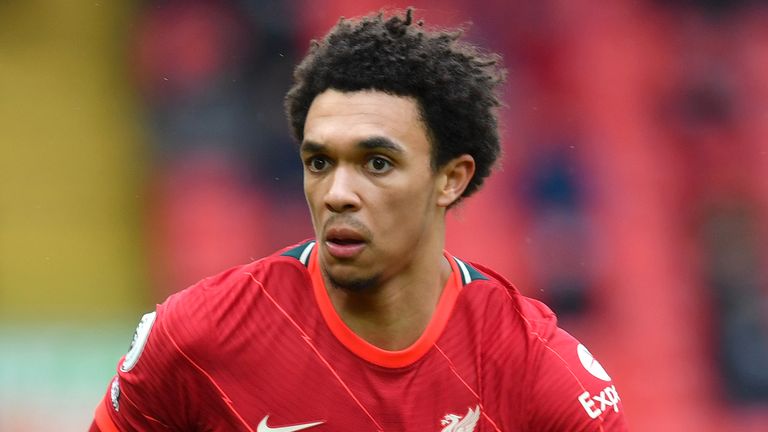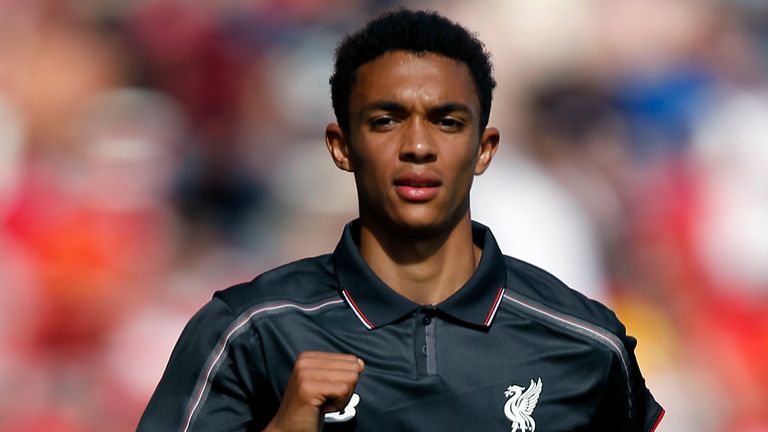How Trent Alexander-Arnold found his right-back position at Liverpool
'It was obvious that Trent needed to be confronted and he needed to be challenged. You wouldn't be able to trust him playing in front of 50,000 at Anfield if you knew he was going to quit and give up in the tough moments, which he could do when he was younger.'
Thursday 2 September 2021 13:28, UK
As Trent Alexander-Arnold returns to the England squad to try and stake his place as Gareth Southgate's No 1 choice right-back, an extract from The Dream Factory: Inside the Make-or-Break World of Football' Academies, takes a look back at how the Liverpool superstar grabbed hold of his new position during his time in the club's academy...
'Get at Trent! Get at Trent!' Neil Critchley bellowed from the side of the pitch as Bobby Adekanye was fed the ball. Seventeen-year-old Trent Alexander-Arnold was new to the role of right-back, a fish out of water. Until now, he'd mostly played in midfield, either wide-right or centrally; he'd even spent some time at centre-back. Right-back brought a whole new gamut of challenges - one-v-one defending, learning how and when to get forward to support the attack, and what exactly to do when faced with wingers faster, stronger and trickier than himself. His head would spin and frustration would build, often to the point he would angrily send balls flying across to the far reaches of the training pitches of Liverpool's academy.
Alexander-Arnold's coaches knew these growing pains were a necessary part of the teenager's adaptation to a new position. The player knew it, too, having bought into the idea of reinventing himself as a right-back. Critchley, who spent seven years coaching in Liverpool's academy - first as under-18s manager, then in charge of the under-23s - before leaving to become Blackpool's head coach in March 2020, understood that such daily challenges were crucial if Alexander-Arnold was to make steady, incremental gains. Through trial and error - and it was mostly error in those early days - he would learn where best to position himself when an attacker raced toward him with the ball, how to shape his body to influence his opponent's next move, and how to time his challenges so not to overcommit or concede a foul. Critchley would have the best wingers in his squad go up against Alexander-Arnold in training matches. He'd demand they get on the ball as often as possible and run at the fledgling full-back, over and over. In one instance, it would be the dynamic Adekanye; in others, it would be Ben Woodburn or Yan Dhanda.
'If the winger was getting success against him in training, we just used to keep giving him the ball,' Critchley says. 'Some days I'd think, "I've got Trent here; he's going to quit." And the next day he'd come back and it was as if he was like, "Right, I'll show you."
'It was obvious that Trent needed to be confronted and he needed to be challenged. You wouldn't be able to trust him playing in front of 50,000 at Anfield if you knew he was going to quit and give up in the tough moments, which he could do when he was younger. We used to recreate that as best we could. You can never recreate 50,000 people, but you can put him in situations within training where you know he might fail. As long as you let him know the reasons why you're doing it, he can see the reasoning behind it. We did it because we knew he had the potential to go on and be a top player, and we thought that was the best way of helping him. It was tough, but we made it tough for a reason.
'One of his main qualities is him as a person. You only need to hear him speak now at such a young age, he's a very impressive person. He's level-headed, but he has the fire inside him; he hates to lose. When he was younger, he didn't know how to handle those emotions. He used to throw his toys out the pram if things weren't going his way in training. Often, myself or Alex [Inglethorpe, Liverpool's academy manager] would have to say to him, "You need to go and fetch that ball that you've just kicked a mile away," and he'd go off sulking, in a huff, to collect the ball he'd just wellied.'
These moments within training games were carefully designed by Liverpool's coaching staff to stimulate and nurture the precise aspects of Alexander-Arnold's physical, mental, tactical and technical capabilities they'd identified for improvement. A lifelong Liverpool fan who'd been with the club since the age of six, Alexander-Arnold had long been considered one of the academy's standout talents, but such a bespoke development programme and individualised attention to detail was not favouritism in reaction to his immense potential; it is the same for every player within Liverpool's academy.
'Liverpool have a distinct style of play that's come down through the ages, and that's evident even at academy level,' says Liverpool's former under-23s manager Michael Beale, who is now part of Steven Gerrard's coaching staff at Rangers. 'But the plan is to focus on the individual and give them a real platinum service. That's driven from the owners, [director] Mike Gordon, [sporting director] Michael Edwards and Alex Inglethorpe down. That's the philosophy of the club and it's something the club pride themselves on. It might not be unique to Liverpool, but because Liverpool really believe it in, they're stronger than most other clubs in that type of work.'
Liverpool's focus on the individual necessitates constant communication, both among staff and between coaches and players. First, the coaches determine the needs of each player, then comes the implementation and review process, communicating and collaborating with the player to ensure total buy-in. As it related to Alexander-Arnold, once it had been determined that a change of position would best suit his development, Inglethorpe and Critchley, his under-18s manager at the time, sat him down in one of the small offices on the academy complex. They talked him through their plan, discussing its benefits and using videos to help him visualise how his game was to evolve.
'Some of the best coaching goes on off the pitch, in the office, speaking with the players and getting to know them as people,' Critchley explains. 'The plan is always better if it's a joined-up plan and the player believes in it as well. If Trent thought he couldn't play right-back or he wanted to be a midfield player, then it never would have worked.
'We used to conduct regular reviews with the players. I remember doing quite a few with Trent, sitting down with him and taking him through areas of improvement. When he plays at right-back, he's got a range of technical attributes and the way he sees the game. He'll pass the ball like a midfielder from right-back because he used to play in midfield. We thought that was going to be his position because we thought he was better when he saw the game in front of him. At right-back, you're always moving forward, coming on to the ball. That was something we spoke long about. Many different opinions were shared - sometimes agreed, sometimes disagreed. In the end, it worked out well for him.'
The Dream Factory: Inside the Make-or-Break World of Football' Academies by Ryan Baldi, shares unparalleled behind-the-scenes access to football academies at all levels, revealing in gripping detail how home-grown Premier League stars such as Marcus Rashford, Trent Alexander-Arnold and Phil Foden are created.
It is available to buy in all good bookshops and here online





